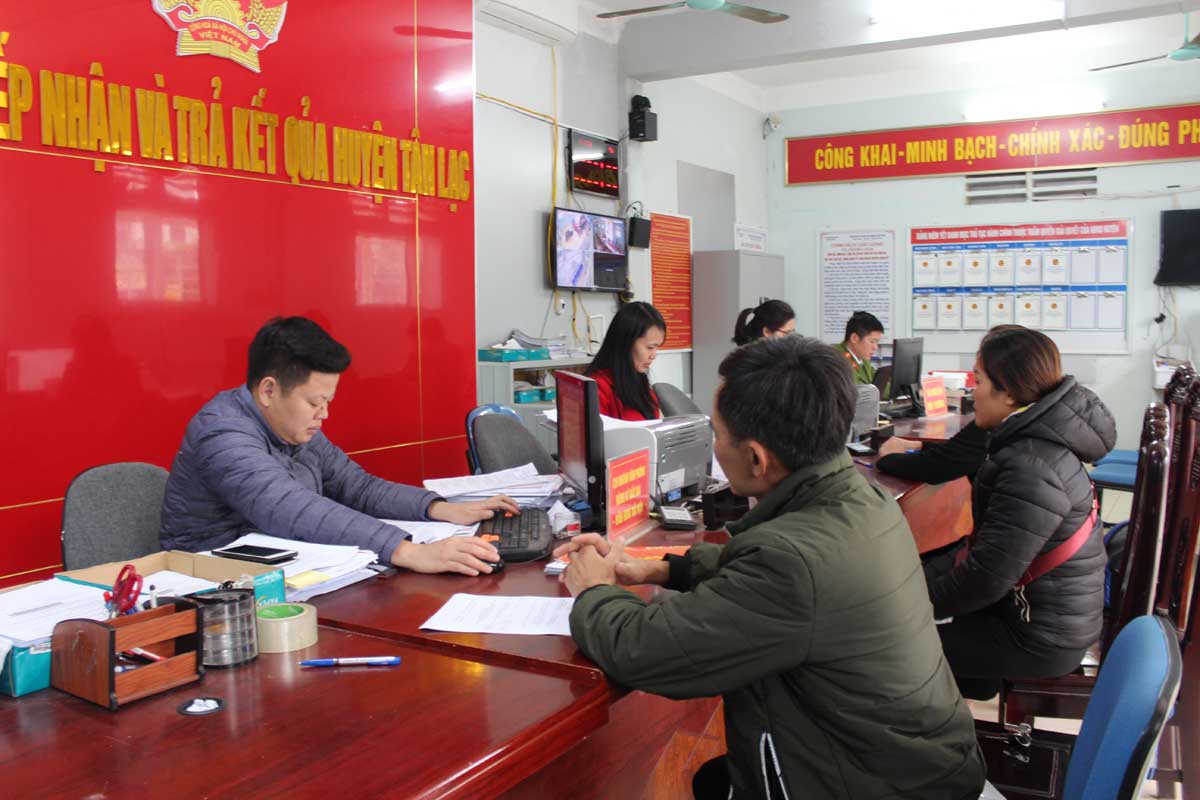
(HBO) - From the beginning of 2020 to November 6, Tan Lac district was able to provide only 55 administrative procedures online at levels 3 and 4. However, thanks to many effective measures, in less than two months later, the district has so far handled 10,441 documents online at levels 3 and 4.
 In nearly two months, Tan Lac has
received 10,441 documents submitted online at levels 3 and 4.
In nearly two months, Tan Lac has
received 10,441 documents submitted online at levels 3 and 4.
Vice Chairman of the Tan Lac
People’s Committee Le Chi Huyen candidly talked about shortcomings in the local
administrative reform, particularly regarding level-3 and level-4 online public
services.
Weak communication work was identified
as the key problem. Therefore, on September 18, 2020, the district’s People’s
Committee issued Plan No 99/KH-UBND on raising public awareness on the benefits
of and how to use level-3 and level-4 online public services. The online
services will help boost operation effectiveness of local State agencies,
enhance transparency, cut costs and facilitate people and enterprises’ access
to information and services.
The communication activities also
provide concrete guidance on how to access and use the online public services at
the website: dichvucong.hoabinh.gov.vn.
As a result, the handling of
administrative procedures using the online services has been done promptly and
correctly, with the work being among the important criteria to assess the
annual results of administrative reform at agencies, units and communal-level
People’s Committees.
In nearly two months from
November 6 to December 22 in 2020, Tan Lac received 10,441 documents submitted
online at levels 3 and 4./.
The Standing Board of the Hoa Binh provincial Party Committee has agreed in principle on a proposal by the Standing Board of the Party Committee of Hoa Binh city to gather feedback on the city’s 1:2000 zoning plan, which forms part of its broader urban development strategy.
Hoa Binh province has made notable progress in public administration reform and digital government development, with the satisfaction index among citizens and businesses reaching over 84%, according to recent government evaluations.
Thanks to great efforts by local authorities in recent times, the governance and public administration performance of Mai Chau district has been significantly improved.
In the afternoon of June 6, the Party Committee, the People's Council, the People's Committee and the Fatherland Front of Lac Son district solemnly held a meeting to celebrate the 139th anniversary of the district's founding (1886–2025) and the 79th anniversary of the establishment of the district's Party Committee (1946–2025). There was the attendance of Mr. Bui Van Thang, the Vice Chairman of the Provincial People's Council; Mr. Quach Tat Liem, the Vice Chairman of the Provincial People's Committee; Ms. Dang Bich Ngoc, the Deputy Head of the National Assembly Delegation of the province; as well as the former leaders of the province and district through various periods, who are the natives of the district.
Implementing the Politburo’s Resolution No. 57-NQ/TW on breakthroughs in science – technology, innovation, and digital transformation is a golden opportunity for the northern mountainous province of Hoa Binh to renew growth model, improve competitive edge and shorten digital gap.
Resolution 57-NQ/TW, issued by the Politburo on December 22, 2024, identifies sci-tech, innovation, and digital transformation as strategic breakthroughs to build a developed and prosperous nation. In Hoa Binh province, this spirit is not just a slogan, it’s being put into action through concrete initiatives that form a "new development triangle”: digital citizenship, digital economy, and digital administration.



 In nearly two months, Tan Lac has
received 10,441 documents submitted online at levels 3 and 4.
In nearly two months, Tan Lac has
received 10,441 documents submitted online at levels 3 and 4.